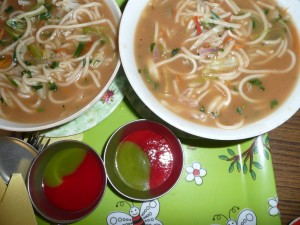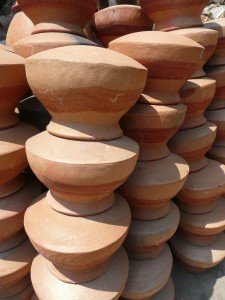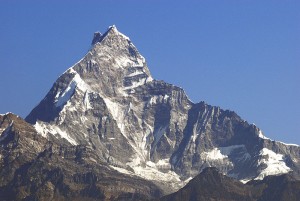I also stumbled across Mahabir Pun in that famous BBC article while searching the Internet for a medical organization in Nepal that accepted volunteers. I wanted to trek in Nepal, but like many people I felt guilty on some level traveling for pleasure while 1.9 billion people in the world lived in poverty. Volunteer work was a way to temper the guilt. I contacted Dr. Leonard Skov, HEF’s director in Nebraska, and simply asked if they needed a volunteer doctor.

Lunch of noodle soup and spicy condiments.
I spent about a year preparing by studying about Nepal and collecting medical supplies. My contacts in the Wilderness Medical Society led me to Dr. Stephen Bezruchka who had lived, worked and written extensively about the country. His books included travel and cultural advice. We emailed for months and he spared no criticism. He forced me to examine why I wanted to work in Nepal…what were my motives, how did they influence my interactions and most importantly did I understand how much harm I was capable of inflicting…not medically, but with my own cultural biases and ignorance. I came to realize everyone has good intentions…which are not very helpful…what you need is knowledge and experience. If you lack these critical skills then find a mentor.
My first trip in April 2002 was an awakening. Arriving in Kathmandu is like being thrust into the 1960s. As a former hippie I kept thinking I was four decades too late. Surrounded by a cacophony of blaring horns, shouting and enough people to make Times Square on New Years Eve seem desolate I followed Mahabir out of the airport. My first introduction to Mahabir was short, as he left me at the hotel with his friend. He would meet me in Pokhara in a few days and escort me to Nangi. My first impression: He was very quiet and unassuming. The following day I flew to Pokhara, a large city in western Nepal and Mahabir’s home. Mahabir’s uncle, Deobahadur, met me at the airport on his motorcycle…he deposited me and my four large bags of supplies into a taxi which arrived at his three story house on a quiet street in northern Pokhara. Here I met the extended family including Mahabir’s wife, Ommaya, and his eldest daughter Juna, who was three years old. It is customary for multiple generations and extended family members to share a home both in the rural and urban areas.
I spent the next several days under the tutelage of Deobahadur, a retired Gurkha. I have come to know him over the last 12 years as a kind, educated and wise man. During that first visit he took me all around Pokhara and explained the culture. He introduced me to dozens of family members and friends. He housed me, fed me and together we sat on his rooftop drinking Nepali beer…which by the way comes in only quart sized bottles. Up on the roof we philosophized about the future of Nepal while watching the sun set on the magnificent Machapuchare.
Join me next week for more about my first visit to Nepal and the challenges of working in a small rural clinic a days walk from the nearest road…without running water…or electricity…but with two of the most energetic, smart and welcoming health providers I have ever met. Please join me next week to meet Lila and Rupa and begin to understand the genius of a man who knows exactly how to pair the right parts of a plan.


